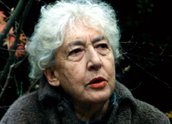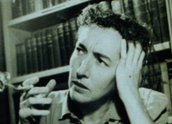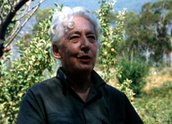


Kylie Tennant (1986)
Synopsis
An interview with the writer Kylie Tennant (1912–1988), filmed at her home in Blackheath NSW, between February and May 1985.
Curator’s notes
In early 1985, three years before Kylie Tennant died, Erika Addis and a small all-women crew filmed a lengthy interview with the writer at her home in Blackheath in the Blue Mountains, New South Wales. The film was produced as part of the Australia Council’s Archival Film Series. Elizabeth Riddell interviewed Tennant with Addis on camera and Pat Fiske recording sound. The film is essentially Tennant speaking to camera, interspersed with private collection stills. Tennant is an engaging subject, taking the viewer through her writing career with a composure and serenity befitting her tranquil Blackheath surrounds.
Tennant states that when she began her career, ‘turning out what had come to be called literature was a very casual thing’. As an advocate of social justice, she had a rather more purposeful approach to writing. Determined to experience first hand the lives of her characters before attempting to write them, she travelled the bush with the unemployed during the Depression, spent time in the slums of 1930s Surry Hills, lived in Aboriginal communities and even spent a short stint in prison.
Tennant was born in Manly, New South Wales, in 1912. The interview covers her life, beginning with her school days at Brighton College and her undergraduate period at Sydney University where she formed a friendship with Lewis Charles Rodd – or Roddy as she refers to him – whom she married in November 1932. The two were members of various social and political organisations throughout the Depression and the Second World War. Rodd was a schoolteacher, founder of the Educational Workers’ League and activist in the NSW Teachers’ Federation, and a great proponent and supporter of Tennant’s writing career. Together they had two children. While she refers to the relationship with Rodd in very positive terms, the latter part of it was not always plain sailing, with Rodd attempting suicide in 1960 and son John dying in mysterious circumstances in 1978.
Throughout the interview Tennant talks about the jobs she held at various times in her life and outlines the evolutions of many of her works. Included are the novels, Tiburon, Foveaux, The Battlers, Ride On Stranger, Time Enough Later, Lost Haven and The Man on the Headland; the children’s work, All the Proud Tribesmen; her collections of children’s plays; and the non-fiction works Australia: Her Story and Evatt: politics and justice. Tennant, a recipient of the Order of Australia in 1980, died in 1988. The film was distributed by the Sydney Filmmakers Co-op until its closure in the mid-1980s.
- Overview
- Curator’s notes
- Video 3 clips

- Principal credits
- Find a copy
- Make a comment
- Map
- Add your review



